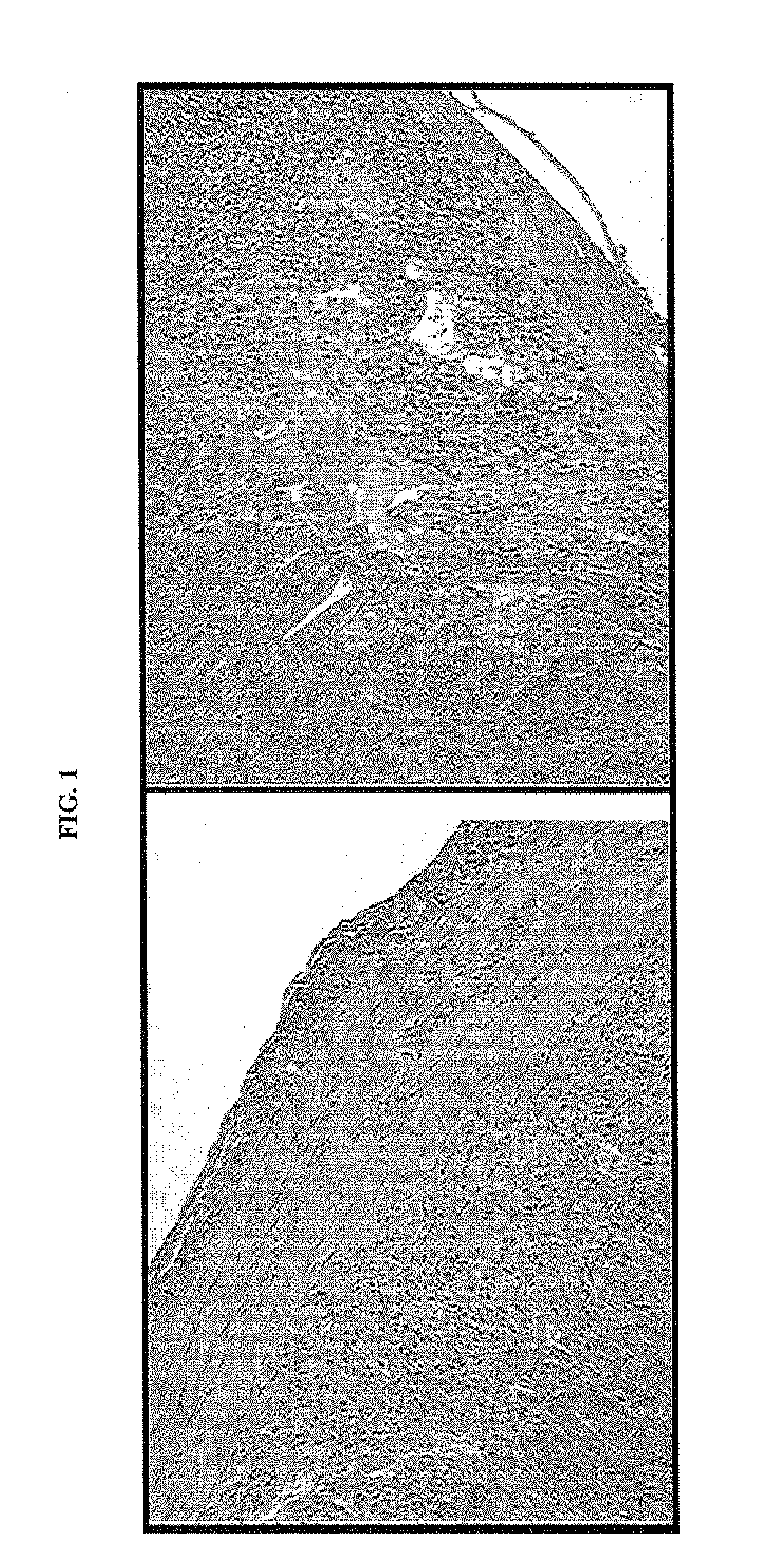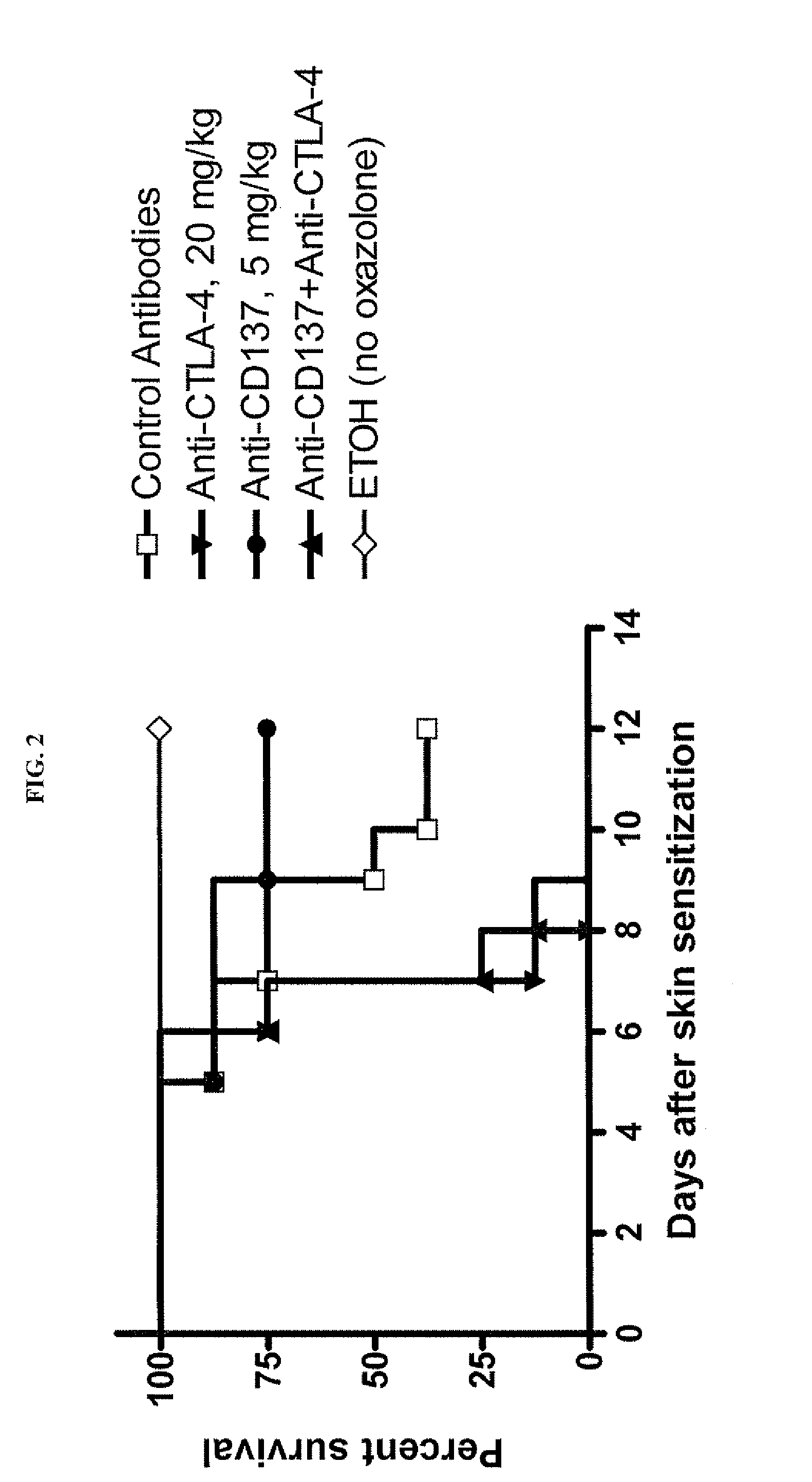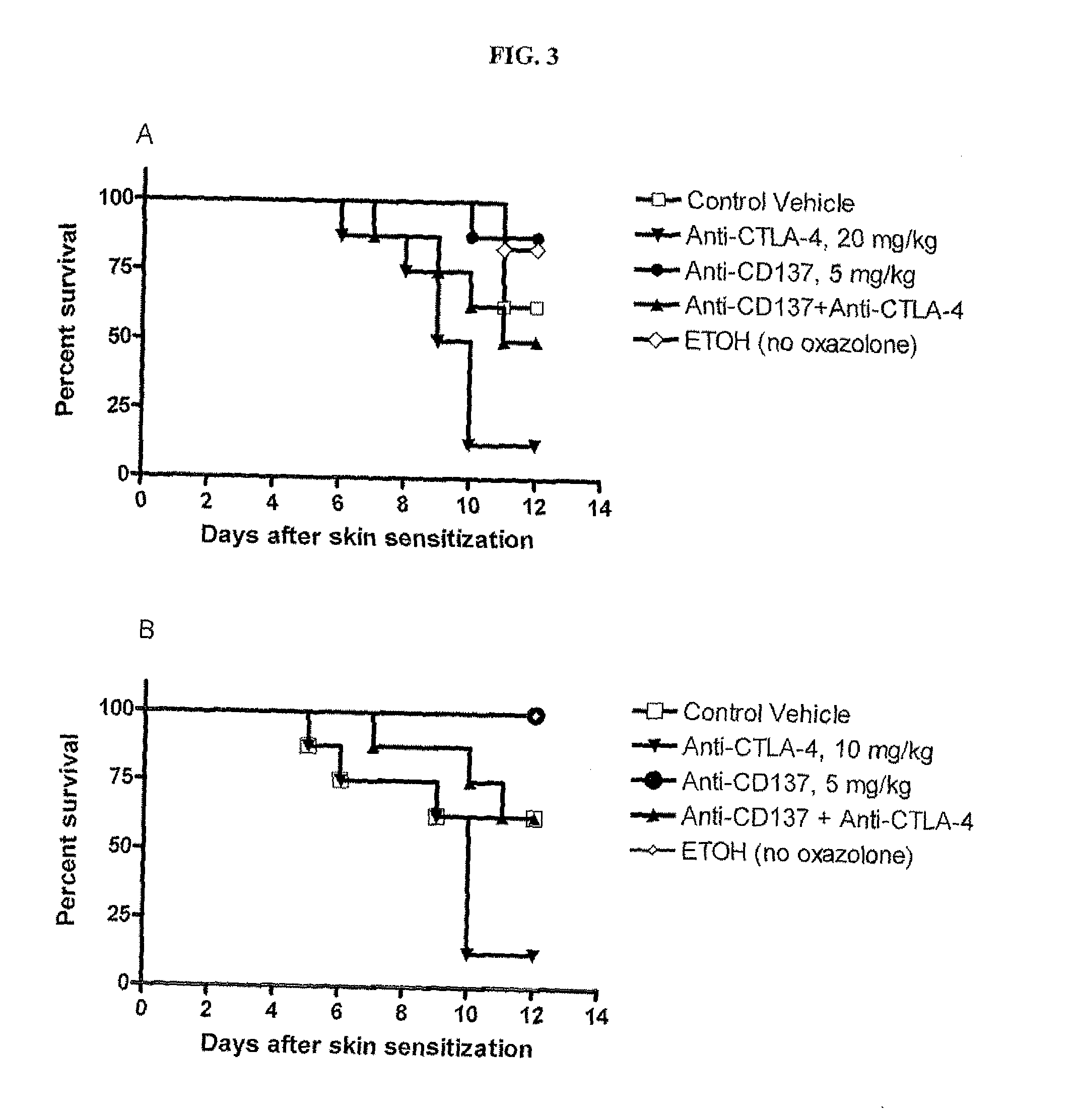Combination of cd137 antibody and ctla-4 antibody for the treatment of proliferative diseases
a technology of proliferative diseases and antibodies, applied in the field of oncology, can solve the problems that the administration of ipilimumab to healthy cynomolgus monkeys failed to detect this adverse event, and achieve the effects of improving clinical signs, preventing the rate of body weight loss, and significant body weight loss
- Summary
- Abstract
- Description
- Claims
- Application Information
AI Technical Summary
Benefits of technology
Problems solved by technology
Method used
Image
Examples
example 1
Method of Assessing the Effect of the Combination of CD137 Agonistic Antibodies with Anti-CTLA4 Blockage on Tumor Growth in Murine Colitis Models
Background
[0099]The antitumor activity of a homolog of ipilimumab, a CTLA-4 blocking agent, was investigated in combination with CD137 agonistic antibodies, in preclinical studies. CD137 agonism can ameliorate the development of autoimmunity in many experimental mouse models of autoimmune disease, whereas CTLA-4 blocking mAb promotes expansion and infiltration of tumor-primed cytolytic T cells.
[0100]The inventors hypothesized that this combinatorial approach may produce therapeutic synergy based on their unique mechanism of action and cellular targets in preclinical tumor models.
[0101]An emerging approach for the treatment of cancer involves modulation of antitumor immune responses by treatment with monoclonal antibodies to T cell co-stimulatory / co-inhibitory receptors, CD137 agonistic mAb, and ipilimumab (CTLA-4 blocking mAb). In some prec...
example 2
Method of Assessing Whether a Murine Oxazolone-Induced Colitis could be Used as a Model to Study the Effect of Immunomodulatory Agents
Materials and Methods
Antibodies
[0105]The hybridoma for the anti-CTLA-4 monoclonal antibody (mAb), clone 4F10-UC10 (hamster IgG anti-mouse CTLA-4) (Walunas et al., Immunity, 1(5):405-413 (August 1994)) was obtained from the American Tissue Type Collection (Manassas, Va.), and assigned as BMS-863019. BMS-469492 (clone 1D8) is a rat IgG2a with specificity to mouse CD137 (Shuford et al., J Exp Med., 186(1):47-55 (Jul. 7, 1997)). Both antibodies were produced and purified by BMS (Protein Therapeutics Division, Hopewell, N.J., USA), and certified to have 95% purity and <5% high molecular weight species. Stock solutions of both antibodies were kept at −80° C. and were thawed out at 4° C. prior to use. Control antibodies consisted of a polyclonal hamster IgG or rat immunoglobulins (Jackson ImmunoResearch, West Grove, Pa.). Dosing solutions of antibodies were ...
example 3
Method of Assessing the Effect of the Combination of CD137 Agonistic Antibodies with Anti-CTLA4 Blockage on Tumor Growth in a Murine Oxazolone-Induced Colitis Model
[0110]Since CD137 agonistic mAb can prevent or ameliorate the development of autoimmunity in many experimental mouse models of autoimmune disease (Foell et al., Ann. NY Acad. Sci., 987:230-235 (April 2003); Sun et al., Nat. Med., 8:1405-1413 (2002); Foell et al., Immunology, 113(1):89-98 (September 2004); Seo et al., Nat. Med., 10:1088-1094 (2004)), it was of interest to determine if a CD137 agonist antibody (BMS-469492) could modulate the effect of CTLA-4 blockade in immune-mediated colitis models.
Methods
[0111]CD137 mAb (BMS-469492, 5 mg / kg, q3dx3) and CTLA-4 mAb (UC10, 20 mg / kg, q3dx3) were administered intraperitoneally on days 0, 3, and 6 after epicutaneous challenge with oxazolone (day 0) alone or in combination. On day 5, animals were re-challenged with 0.75% oxazolone intrarectally. ETOH (ethanol)—treated group did...
PUM
| Property | Measurement | Unit |
|---|---|---|
| Volume | aaaaa | aaaaa |
| Volume | aaaaa | aaaaa |
| Volume | aaaaa | aaaaa |
Abstract
Description
Claims
Application Information
 Login to View More
Login to View More - R&D
- Intellectual Property
- Life Sciences
- Materials
- Tech Scout
- Unparalleled Data Quality
- Higher Quality Content
- 60% Fewer Hallucinations
Browse by: Latest US Patents, China's latest patents, Technical Efficacy Thesaurus, Application Domain, Technology Topic, Popular Technical Reports.
© 2025 PatSnap. All rights reserved.Legal|Privacy policy|Modern Slavery Act Transparency Statement|Sitemap|About US| Contact US: help@patsnap.com



